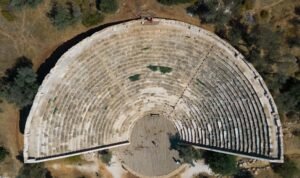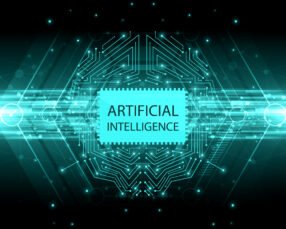Introduction to Artificial Intelligence in Ancient History
Artificial Intelligence (AI) is often viewed as a marvel of the modern digital age, yet its conceptual roots can be traced back to ancient history. This exploration into the past reveals that ancient civilizations not only dreamed of machines and automated systems but also laid the foundational ideas that resonate with today’s AI technologies. By examining myths, inventions, and philosophical insights from bygone eras, we uncover a fascinating narrative of humanity’s longstanding fascination with creating intelligence.
Theoretical Foundations: Ancient Myths and AI
The Greek Myth of Talos and the Concept of Automata
Talos, a giant bronze automaton from Greek mythology, protected Europa in Crete from pirates and invaders. This myth exemplifies early human aspirations to create intelligent protectors, highlighting an ancient version of robotics and artificial intelligence concepts.
The Ancient Indian Epic of Mahabharata and Advanced Machinery
The Mahabharata, with its descriptions of vimanas (flying machines) and advanced weaponry, reflects an early interest in technological innovation and the concept of mechanized control, akin to modern AI’s objectives of enhancing human capabilities through technology.
Early Concepts of Automation and Robotics
Ancient Automatons and Their Influence on AI Development
From the mechanical servants of Hephaestus, the Greek god of blacksmiths, to the water clocks in ancient Egypt, early automatons demonstrate mankind’s desire to mimic life and intelligence, laying the groundwork for robotics and AI.
The Antikythera Mechanism: An Ancient Greek Analog Computer
The discovery of the Antikythera mechanism, a device used to predict astronomical positions and eclipses, showcases the ancient world’s sophisticated understanding of mechanical computing, a precursor to modern computational models.
Artificial Intelligence and Ancient Civilizations
Egyptian Engineering Marvels: A Proto-AI Perspective
The construction of the pyramids and other architectural wonders in ancient Egypt, using advanced mathematics and engineering, can be seen as an early manifestation of AI principles, where knowledge is applied to solve complex problems.
Sumerian Innovations: The Cradle of AI Inspiration?
The Sumerians, credited with the invention of the wheel, cuneiform writing, and early forms of arithmetic, contributed significantly to the development of structured processes and algorithms, essential components of AI.
Philosophical Insights on AI from Ancient Thinkers
Aristotle’s Logic and Early Algorithms
Aristotle’s work on logic, particularly his syllogisms, can be considered an early form of algorithmic thinking, crucial for the development of AI programming and computational logic.
The Daoist Philosophy and the Concept of Natural Order in AI
Daoist teachings on harmony and the natural order offer insights into AI ethics and the importance of balance between technological advancement and natural processes.
Ancient Codes and the Precursors to Modern Computing
Binary Code in Ancient Texts: A Hidden AI Language?
Exploring the possibility that ancient texts and numbering systems, such as those used in the I Ching, embody principles similar to the binary code used in computer programming and AI.
The I Ching: An Ancient Source of Algorithmic Wisdom
The I Ching or Book of Changes, with its binary-like system of trigrams and hexagrams, represents an ancient method of generating outcomes based on a set of variables, mirroring algorithmic decision-making in AI.
Mythology vs. Reality: Evaluating Ancient AI Constructs
The Legend of the Golem: An Early AI Prototype?
The Golem of Jewish folklore, a clay figure brought to life through mystical means, parallels modern discussions about AI, robotics, and the ethical implications of creating life-like machines.
Analyzing Historical Claims of Ancient AI Through Modern Science
This section evaluates the plausibility of ancient AI constructs and their influence on modern AI development, using scientific analysis to separate myth from historical fact.
The Role of Ancient Engineering in Shaping Modern AI
From Archimedes’ Inventions to AI Principles
The inventions of Archimedes, including war machines and water screws, demonstrate early principles of automation and mechanical intelligence, inspiring contemporary AI research and development.
The Influence of Leonardo da Vinci’s Mechanical Designs on AI
Leonardo da Vinci’s mechanical designs, such as his humanoid automaton and aerial screw, foreshadow modern robotics and AI, reflecting the timeless human quest to replicate and understand intelligence.
Astrological Computations and AI
Babylonian Astronomy: The Precursor to Computational Models
The Babylonians’ advanced astronomical calculations and their development of one of the earliest known mathematical systems showcase early human efforts to understand and predict natural phenomena, a core aspect of AI’s predictive analytics.
The Mayan Calendar: An Advanced Computational Achievement
The complexity and accuracy of the Mayan calendar exemplify early achievements in computational thinking and data analysis, principles that underpin modern AI algorithms and machine learning.
Ancient Algorithms and Data Processing
The Use of Algorithms in Ancient Maritime Navigation
Ancient mariners’ use of star charts, compasses, and other navigational aids involved complex algorithms for plotting courses and determining locations, illustrating early forms of data processing and decision-making systems.
Ancient Agricultural Techniques: Early Forms of Data Analysis
The development of agricultural calendars and irrigation systems based on astronomical observations and seasonal cycles demonstrates an early understanding of data analysis and optimization, akin to AI’s role in modern agriculture.
Cryptography in Ancient History and Its Connection to AI
The Scytale of Sparta: An Early Enciphering Technique
The use of the scytale by Spartan military leaders for secure communication represents one of the earliest forms of cryptography, a field that has become integral to AI, particularly in data security and encryption.
The Caesar Cipher: Foundations for Cryptography in AI
Julius Caesar’s use of a substitution cipher for confidential messages highlights the longstanding human endeavor to secure information, a principle that continues to guide AI development in cybersecurity.
The Influence of Ancient Technology on Modern AI Ethics
Historical Perspectives on Machine Intelligence and Morality
Examining ancient texts and philosophies provides valuable insights into the ethical considerations of AI and robotics, offering timeless wisdom on the moral responsibilities of creators.
The Responsibility of Creators: Lessons from Ancient Myths
Ancient myths, such as those of Prometheus and Pandora, serve as cautionary tales on the unintended consequences of innovation, emphasizing the ethical imperatives in AI development.
Comparative Analysis: Ancient Inventions and AI Technologies
The Baghdad Battery and Modern Energy Solutions for AI
Investigating the Baghdad battery’s potential as an ancient electrical device offers intriguing parallels with modern efforts to power AI technologies sustainably.
The Hydraulic Systems of Ancient Civilizations and AI Applications
The use of hydraulic systems in ancient engineering, for tasks such as irrigation and building, mirrors modern AI applications in optimizing resource management and environmental planning.
Educational Implications: Teaching AI with Ancient History
Integrating Ancient Wisdom into AI Curriculum
Incorporating lessons from ancient history into AI education can inspire innovative thinking and ethical considerations among future technologists.
Case Studies from Ancient History for Modern AI Challenges
Analyzing ancient technologies and philosophical dilemmas provides practical case studies for addressing contemporary challenges in AI development and ethics.
Future Perspectives: Bridging Ancient Innovations with AI
The Role of Archaeological Discoveries in AI Research
Emerging archaeological findings, revealing ancient technologies and knowledge systems, offer valuable insights for advancing AI research and development.
Imagining Future AI Technologies Inspired by Ancient History
Speculating on future AI innovations, inspired by ancient inventions and ideas, encourages a multidisciplinary approach to technology development, blending historical wisdom with cutting-edge science.
The Use of Artificial Intelligence in Deciphering Ancient Languages
AI’s Role in Translating Undeciphered Scripts
Recent advances in AI have enabled researchers to make significant progress in translating ancient, previously undeciphered scripts, opening new windows into human history.
Enhancing Historical Understanding Through AI Algorithms
AI algorithms are increasingly used to analyze historical data, from artifacts to texts, improving our understanding of ancient civilizations and their contributions to human knowledge.
FAQs
- How did ancient civilizations influence modern AI?
- Can AI help in understanding ancient technologies?
- What are the ethical lessons from ancient myths relevant to AI?
- How can AI contribute to archaeological discoveries?
- What ancient inventions are most similar to AI?
- Is there evidence of actual AI use in ancient history?
Conclusion
While the notion of artificial intelligence in ancient history might seem anachronistic, a closer examination reveals a continuum of human ingenuity and imagination. From the mythological automata of ancient Greece to the sophisticated algorithms of the Babylonians, our ancestors laid the conceptual groundwork for today’s AI technologies. Their stories and inventions remind us that the quest to understand and replicate intelligence is as old as civilization itself, offering both inspiration and cautionary tales for the future of AI. In embracing this rich heritage, we can better navigate the ethical, philosophical, and technological challenges that lie ahead.




